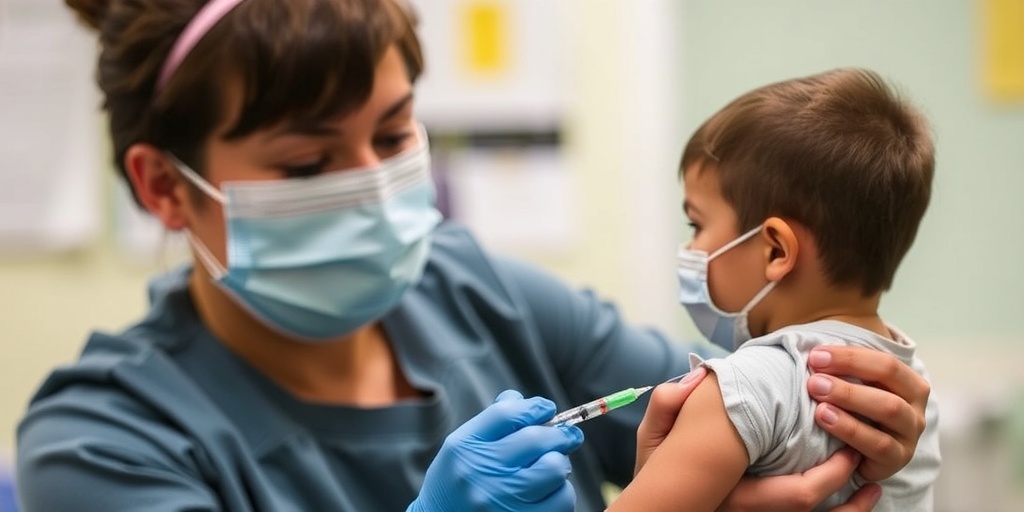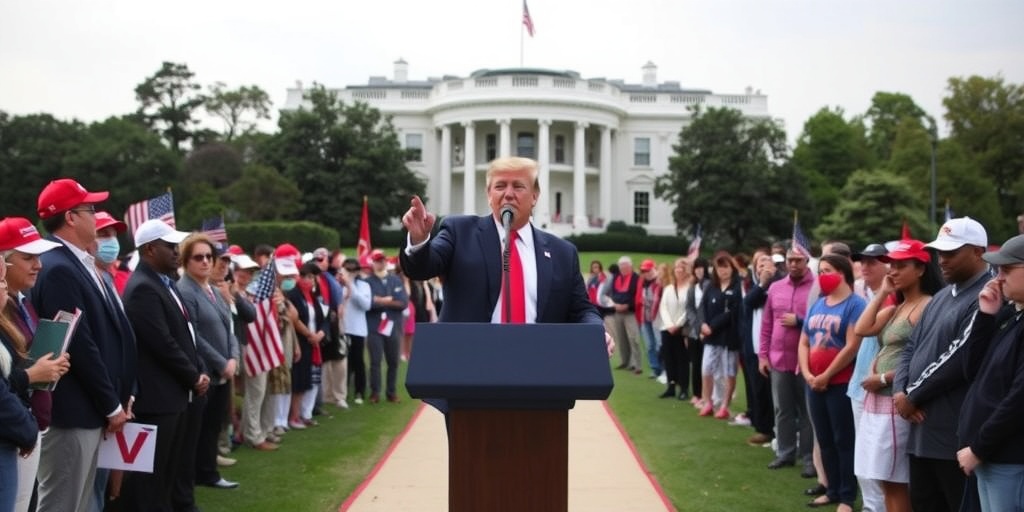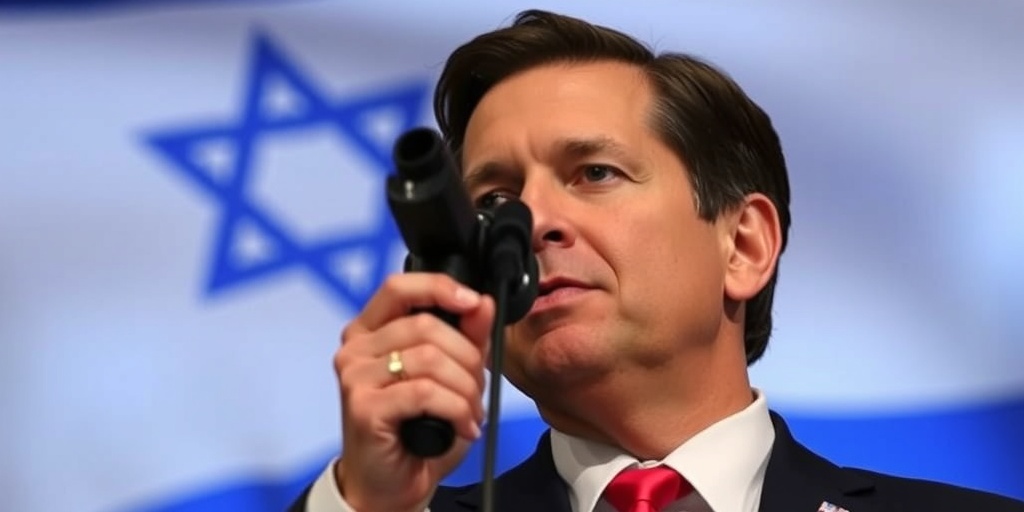Now Reading: Experts Claim Federal Officials Downplaying Measles Vaccination Risks
-
01
Experts Claim Federal Officials Downplaying Measles Vaccination Risks
Experts Claim Federal Officials Downplaying Measles Vaccination Risks

Title: Criticism of Health Secretary’s Response to Texas Measles Outbreak
In a significant test of the Trump administration’s handling of an infectious disease emergency, Health Secretary Robert F. Kennedy Jr. has come under scrutiny for his measured response to a measles outbreak in West Texas. Experts and health officials are expressing concerns over a lack of strong advocacy for childhood vaccinations amidst the growing crisis.
At a recent cabinet meeting, Secretary Kennedy faced criticism for downplaying the severity of the outbreak, which has already affected over 140 individuals and resulted in the death of a child—the first measles-related death in the United States in a decade. In the wake of this backlash, Kennedy shifted his tone on social media, labeling the outbreak a “top priority” for the Department of Health and Human Services (H.H.S.) on Friday. He highlighted several initiatives, including financial support for Texas’s immunization efforts and updates to medical advice recommending vitamin A for children. However, notably absent from his communications was a direct call for parents to vaccinate their children against measles.
The Centers for Disease Control and Prevention (C.D.C.), which falls under H.H.S., delayed sending out its first substantial notice regarding the outbreak until Thursday, nearly a month after initial cases were recorded in Texas. Dr. Michael Osterholm, an epidemiologist at the University of Minnesota, remarked, “They’ve been shouting with a whisper,” suggesting that the administration’s muted messaging could endanger public health efforts.
The lack of robust communication from federal health officials is especially alarming given Secretary Kennedy’s previous stance on vaccinations, which has been marked by skepticism. He has been known to propagate theories suggesting that the measles, mumps, and rubella (M.M.R.) vaccine is linked to autism and has insinuated that measles outbreaks may have been exaggerated to benefit pharmaceutical companies financially.
Experts fear that this hesitancy to advocate for vaccinations during the Texas outbreak may foreshadow future challenges in managing public health crises more effectively. While Texas health officials assert they do not require extensive federal assistance at this moment, many researchers warn that upcoming outbreaks might not be as easily controlled. Catherine Troisi, an epidemiologist at UTHealth Houston School of Public Health, cautioned that the current outbreak might serve as a “dress rehearsal” that does not bode well for the future of public health.
In previous outbreaks, such as the significant measles event in New York in 2019, the C.D.C. played a pivotal role in educating the public about the dangers associated with the virus and the necessity of adhering to vaccination protocols. During that outbreak, then-Health Secretary Alex M. Azar II publicly decried the misinformation surrounding vaccines and emphasized that measles poses a “highly contagious, potentially life-threatening disease.” He firmly reaffirmed the safety and efficacy of the M.M.R. vaccine, stating that the suffering caused by measles was entirely preventable with proper immunization.
In stark contrast, the messaging during the ongoing outbreak has been notably muted. By the time the C.D.C. finally released its initial statement on the outbreak, the virus had already spread to nine counties in Texas and had resulted in additional cases in neighboring New Mexico. The statement referred to vaccinations as “the best defense against measles infection” but failed to provide a strong directive encouraging parents to vaccinate their children.
On Wednesday, when asked about the outbreak, Secretary Kennedy claimed it was “not unusual” and inaccurately suggested that many of the hospitalized individuals were being quarantined for reasons unrelated to measles infections. There was no mention of vaccines in his statements. In his later social media posts, he emphasized that the department would continue to support Texas’s immunization programs but refrained from a direct appeal for parents to ensure their children receive measles vaccinations.
As a result, the responsibility for vaccinating against measles has largely fallen to state and local authorities, prompting frequent news conferences to promote vaccination clinics and counter misinformation. Louisiana Senator Bill Cassidy, a Republican and physician who supported Kennedy’s confirmation, urged residents in his state to ensure their measles vaccinations were up-to-date, recognizing the cross-border nature of contagious diseases.
Given the highly contagious nature of measles, Dr. Osterholm has noted that the C.D.C. should offer clearer national guidance and demonstrate stronger leadership in addressing the outbreak. He warned, “Any location could be the next hot spot tomorrow,” highlighting the urgent need for a cohesive federal response as cases continue to emerge. The recent report from Texas’s capital, Austin, of a measles case involving an unvaccinated infant reflects the continuous threat and the critical importance of vaccination in public health strategies. The health community watches closely as the response to the outbreak unfolds, highlighting the need for decisive action and clear messaging to protect vulnerable populations.
Stay Informed With the Latest & Most Important News
Previous Post
Next Post
-
 01New technology breakthrough has everyone talking right now
01New technology breakthrough has everyone talking right now -
 02Unbelievable life hack everyone needs to try today
02Unbelievable life hack everyone needs to try today -
 03Fascinating discovery found buried deep beneath the ocean
03Fascinating discovery found buried deep beneath the ocean -
 04Man invents genius device that solves everyday problems
04Man invents genius device that solves everyday problems -
 05Shocking discovery that changes what we know forever
05Shocking discovery that changes what we know forever -
 06Internet goes wild over celebrity’s unexpected fashion choice
06Internet goes wild over celebrity’s unexpected fashion choice -
 07Rare animal sighting stuns scientists and wildlife lovers
07Rare animal sighting stuns scientists and wildlife lovers





















